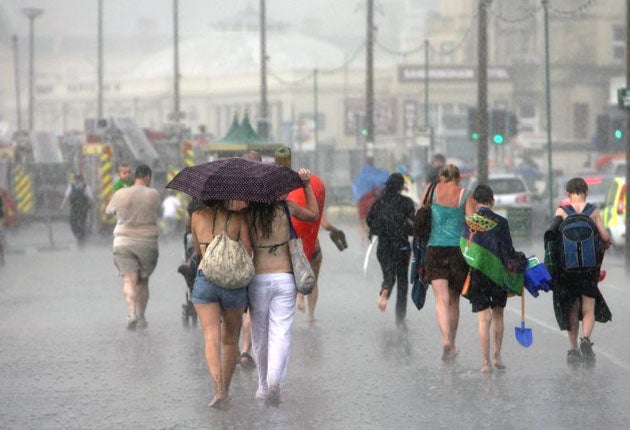Believe it or not, this was the tenth hottest year ever
Summer may have been a washout, but the world is still getting warmer

Your support helps us to tell the story
From reproductive rights to climate change to Big Tech, The Independent is on the ground when the story is developing. Whether it's investigating the financials of Elon Musk's pro-Trump PAC or producing our latest documentary, 'The A Word', which shines a light on the American women fighting for reproductive rights, we know how important it is to parse out the facts from the messaging.
At such a critical moment in US history, we need reporters on the ground. Your donation allows us to keep sending journalists to speak to both sides of the story.
The Independent is trusted by Americans across the entire political spectrum. And unlike many other quality news outlets, we choose not to lock Americans out of our reporting and analysis with paywalls. We believe quality journalism should be available to everyone, paid for by those who can afford it.
Your support makes all the difference.You may not have realised, as you shivered under the grey and drenching skies of August, that you were living through the 10th hottest year ever recorded – but you were.
Figures released by the UK Met Office show the last 12 months constitute the 10th warmest year in the global register, which dates back to 1850. The world's average temperature for 2008 was just over 14.3C, which is 0.3 degrees above the long-term average for 1961-1990.
Yet Britain experienced one of its poorest summers in 2008: it was the seventh wettest, and August was the dullest on record. Not only that: it followed immediately on 2007's record as the wettest of all summers in the record books. The two succeeding damp, cool and often sunless summers were disastrous not only for holidaymakers in Britain; they also played havoc with wildlife, especially insects, and butterflies in particular. For many people, 2008 was "the summer of no butterflies".
However, Britain was affected by these conditions, according to meteorologists, because of a particular phenomenon: the shifting southwards of the jetstream, the rapidly moving band of air between the polar and the tropical zones that directs the course of low-pressure systems across the Atlantic. This may have been caused in turn by La Niña, the occasional cooling of the central and eastern parts of the Pacific Ocean.
Across the world as a whole, temperatures continued to be solidly above the long-term average. This was according to a preliminary report released on behalf of the World Meteorological Organisation by scientists at the Met Office's Hadley Centre and the University of East Anglia's Climate Research Unit.
Globally, the temperature was 0.31C above the 1961-90 average. In the northern hemisphere, the mean temperature was 0.51C above average (the eighth warmest on record) and in the southern hemisphere it was 0.11C above average (20th warmest).
Although the 2008 figure is slightly down on earlier years this century, partly because of the Niña that developed in 2007, global temperatures for 2000-2008 stand almost 0.2C warmer than the 1990-99 average.
The Hadley Centre's Peter Stott said that human actions were making the difference. "Human influence, particularly emission of greenhouse gases, has greatly increased the chance of having such warm years," he said.
"Comparing observations with the expected response to man-made and natural drivers of climate change, it is shown that global temperature is now over 0.7C warmer than if humans were not altering the climate. Without human influence on climate change we would be more than 50 times less likely of seeing a year as warm as 2008."
Commenting on the dramatically increased odds of such warm years because of human induced climate change, Dr Myles Allen, head of Climate Dynamics at Oxford University, said: "Globally this year would have been considered warm, even as recently as the 1970s or 1980s, but a scorcher for our Victorian ancestors."
Join our commenting forum
Join thought-provoking conversations, follow other Independent readers and see their replies
Comments